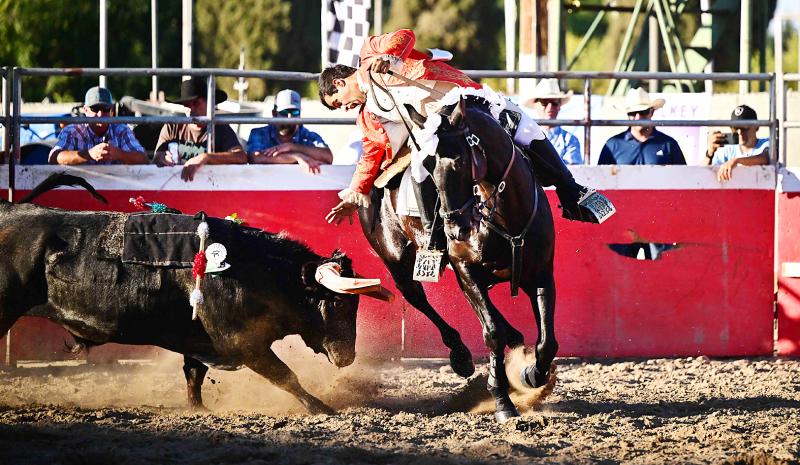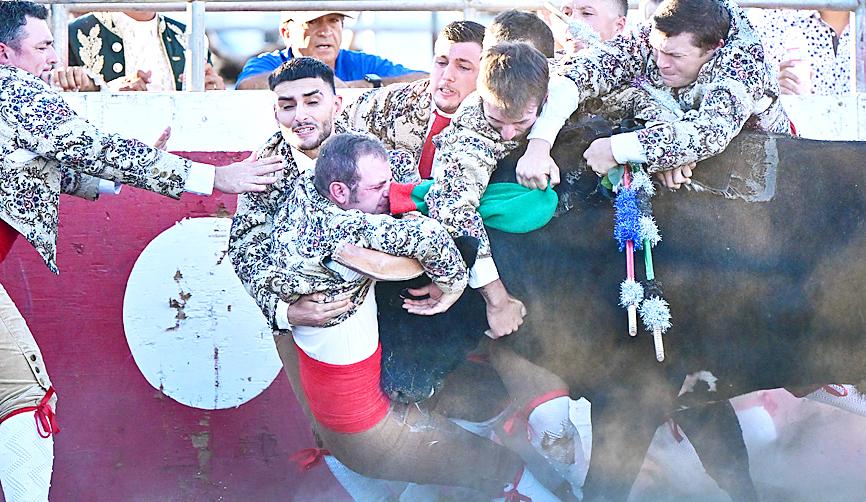Just like any other Portuguese bullfight, the elegant rider deftly guides his horse around the charging bull’s horns, before bending down to plant a bandarilha in its spine.
Except that no blood is spilled — the small spear is Velcro-padded, and sticks to a cushion attached to the bull’s back — and most of the spectators’ cheers are in English.
The scene takes place in Turlock, a small town in the heart of rural California, where tens of thousands of Portuguese Americans have lived for decades, keeping the traditions of their ancestral homeland alive, not least bullfighting.

Photo: AFP
However, due to Californian law, there can be no bloodshed.
“The first time I came here in California, 15 years ago, it was like: ‘Woah, amazing,’ because they have everything like Portugal,” said Joao Soller Garcia, a cavaleiro, or horse rider, who traveled from Lisbon to take part in the bullfight.
“Go to a bullfight in Portugal and it’s the same thing,” he said shortly before entering the arena to be applauded by about 4,000 spectators.

Photo: AFP
The majority of the crowd are of Portuguese descent — mainly immigrants from the Azores islands, who began to settle the agricultural area in the early 20th century.
The community has been growing ever since, with its own newspapers, radio stations and associations.
About 350,000 Californians proudly claim Portuguese heritage, and often remain fiercely attached to their culture and language.
This is the case for Jose, 30, who came to watch the bullfight with friends.
Born in California, he switches from English to Portuguese seemingly without noticing.
“It comes naturally to me. A lot of people here speak Portuguese in their daily life, even the younger ones, “ he said.
“Sometimes it is easier for me to express my feelings or to joke in Portuguese. Portuguese is a very emotional language,” he added.
Above the arena, the Portuguese flag flies alongside the US flag and the Portuguese national anthem strikes up before its US counterpart.
The bullfight is organized by a religious group, led by Antonio Mendes, a cattle breeder in his 70s who revived the tradition in 1993.
“We’re Portuguese and that’s part of our lifestyle, especially the island that I’m from — it’s just rooted,” he said.
Portuguese bullfights differ from the Spanish style, in that the animal is never killed in the arena.
However, in traditional Portuguese events, the bull has been weakened by several bandarilha strikes by the time the forcados — eight men with no horses or protection — enter the arena to tackle the animal with their bare hands.
Because the bulls in Turlock are not hurt, breeders like Mendes have created a bloodline which is just as combative, but less heavy.
“Here the bulls weigh about 900 to 1,000 pounds [408kg to 454kg], because it’s bloodless. In Portugal, they are 1,300, 1,400 pounds. Big bulls,” said George Martins, a forcado captain.
Teams like Martins’ are often dubbed “suicide squads” for a reason — one of them literally has the task of grabbing the bull by the horns, suffering powerful headbutts to the stomach as his companions wrestle with the animal.
“It’s not just brute strength ... it takes a lot of technique,” he said.
Joao Soller Garcia enjoys both the classic Portuguese style and its Californian adaptation.
“Compared to Portugal, it is a little bit more danger, because the bull is not hurt,” he said. “It’s completely bloodless and we have to be more careful ... the bull is at full strength.”
However, for Maxine Sousa-Correia, from a family of cattle breeders who have produced bulls for Californian fights since the 1970s, the use of Velcro bandarilhas diminishes the spectacle.
“Unfortunately, this is a mere imitation... We invented the Velcro pad and the Velcro on the end of the stick just so that it would at least add some color and some pageantry,” she said. “But at the same time, we’re not doing justice to this animal, because this is what this breed is all is for.”
Her husband, Frank Correia, added: “I think it sucks!”
“It should be done the way it is in Portugal, but we can’t, because we’re in the United States of America and, you know, they don’t appreciate the art,” he said.

POLITICAL PRISONERS VS DEPORTEES: Venezuela’s prosecutor’s office slammed the call by El Salvador’s leader, accusing him of crimes against humanity Salvadoran President Nayib Bukele on Sunday proposed carrying out a prisoner swap with Venezuela, suggesting he would exchange Venezuelan deportees from the US his government has kept imprisoned for what he called “political prisoners” in Venezuela. In a post on X, directed at Venezuelan President Nicolas Maduro, Bukele listed off a number of family members of high-level opposition figures in Venezuela, journalists and activists detained during the South American government’s electoral crackdown last year. “The only reason they are imprisoned is for having opposed you and your electoral fraud,” he wrote to Maduro. “However, I want to propose a humanitarian agreement that

Young women standing idly around a park in Tokyo’s west suggest that a giant statue of Godzilla is not the only attraction for a record number of foreign tourists. Their faces lit by the cold glow of their phones, the women lining Okubo Park are evidence that sex tourism has developed as a dark flipside to the bustling Kabukicho nightlife district. Increasing numbers of foreign men are flocking to the area after seeing videos on social media. One of the women said that the area near Kabukicho, where Godzilla rumbles and belches smoke atop a cinema, has become a “real

‘POINT OF NO RETURN’: The Caribbean nation needs increased international funding and support for a multinational force to help police tackle expanding gang violence The top UN official in Haiti on Monday sounded an alarm to the UN Security Council that escalating gang violence is liable to lead the Caribbean nation to “a point of no return.” Special Representative of the UN Secretary-General for Haiti Maria Isabel Salvador said that “Haiti could face total chaos” without increased funding and support for the operation of the Kenya-led multinational force helping Haiti’s police to tackle the gangs’ expanding violence into areas beyond the capital, Port-Au-Prince. Most recently, gangs seized the city of Mirebalais in central Haiti, and during the attack more than 500 prisoners were freed, she said.

DEMONSTRATIONS: A protester said although she would normally sit back and wait for the next election, she cannot do it this time, adding that ‘we’ve lost too much already’ Thousands of protesters rallied on Saturday in New York, Washington and other cities across the US for a second major round of demonstrations against US President Donald Trump and his hard-line policies. In New York, people gathered outside the city’s main library carrying signs targeting the US president with slogans such as: “No Kings in America” and “Resist Tyranny.” Many took aim at Trump’s deportations of undocumented migrants, chanting: “No ICE [Immigration and Customs Enforcement], no fear, immigrants are welcome here.” In Washington, protesters voiced concern that Trump was threatening long-respected constitutional norms, including the right to due process. The